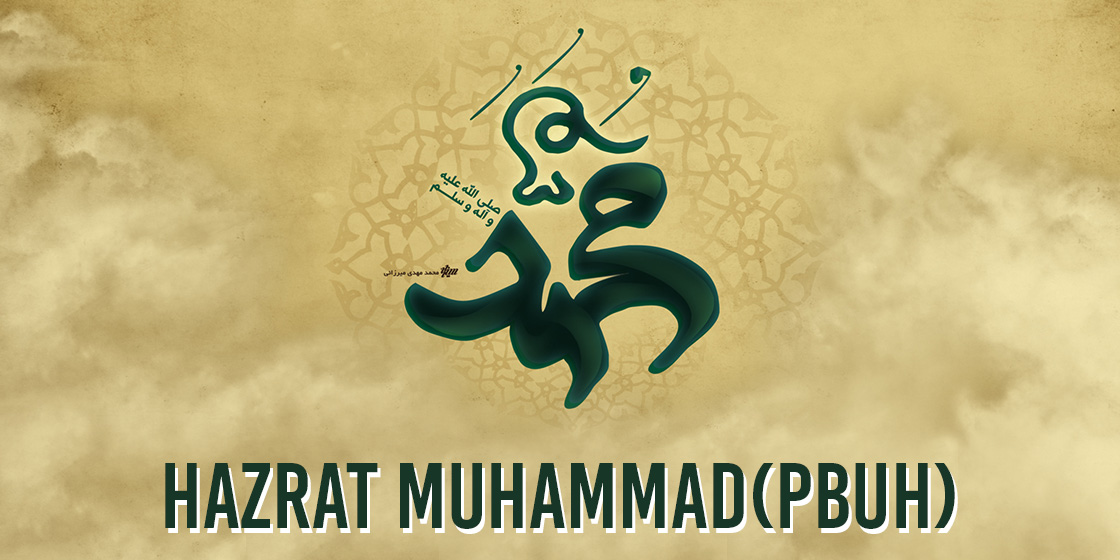
“If they place the sun in my right hand and the moon in the left, I will never give up this matter.” “The mission of the Prophet of Islam was for the whole of mankind across the globe and until the Day of Judgement.”Prophet Muhammad (S) has to be understood as the Messenger of Islam, and also as the most perfect pattern for all of humanity to follow. He came as the last prophet in order to bring Islam, which is the perfect and complete faith, and also as a beacon of light due to his impeccable behaviour. The whole of the Muslim Ummah unites around the Holy Prophet (S). Indeed he is the “pivot of Muslim unity.”
“What the Holy Prophet (S) gave to human beings is a prescription that is effective in all eras, a prescription to counter ignorance of human beings, a prescription to counter oppression for the weak at the hands of powerful people, a prescription to counter the sufferings that have plagued human life since the beginning of creation.”
When the Holy Prophet (S) states that he “will never give up this matter” he is, of course, referring to Islam – neither will he keep quiet about what has been revealed to him, nor will he cease his efforts to bring as many people as possible into Islam.
As Muslims, we must indeed study the life of the Holy Prophet (S) “millimetre by millimetre: every moment of his life embodies an event, a lesson, and a great manifestation of humanity.” We must especially remember the times that Prophet Muhammad (S) was born into, times of polytheism, in which baby girls were buried alive, in which women were afforded no respect, and perhaps draw an analogy to our present times. It is now apparent that again women are not treated respectfully in some parts of the world, oppression and injustice are rife in the world, also in some Muslim majority countries. Racism, xenophobia, warmongering, elitism and nepotism co-exist with “democracy”; humanity is in just as great a need to study the lessons of the Holy Prophet (S) nowadays. Is our current age not as troubled as the time when our dear Prophet (S) was born?
Imam Ali, Commander of the Faithful (A), said of the times of Prophet Muhammad (S): “You people of Arabia were following the worst religion and you resided among rough stones and venomous serpents. You drank dirty water and ate filthy food. You shed blood of each other and cared not for relationship. Idols are fixed among you, and sins clinging to you.”
The steadfastness and humility of the Prophet (S)
Prophet Muhammad (S) had a life full of hardships, and was also the most humble person; these qualities, along with patience and kindness, exemplify the pattern of best manners. Throughout the 23 years of his prophethood, although he was presented with severe hardships, he did not display even the least weakness or doubt. This patience in the face of trials is necessary for all believers, all humanity if they want to fight against oppression and injustice. The patience of the Prophet (S) could also be seen in the Commander of the Faithful, Imam Ali (A). It is narrated that he told his son, Muhammad ibn al-Hanafiyyah, “the mountains may be shaken, they may be removed, but your faith must not be shaken.”
The steadfastness of the Holy Prophet (S) is beautifully presented in the narration about al-Khabbib bin al-Art asking the Prophet (S) to pray to Allah against Quraysh but the Prophet (S) replied to him: “The believers (of nations) before you ere combed with iron combs. The flesh and nerves on their bones were combed but that didn’t make them abandon their religion, and saws were put on the partings of their heads and were split into two but that did not make them abandon their religion.”
It is narrated that the Holy Prophet’s (S) wife Khadija once said to him, “You are nice to your kin, truthful and honest, you share the difficulties of others, are hospitable and help others in the problems of the world.”One of his attributes was generosity, also as a leader of the community. It was essential for him to be at the same level as the people of his community; in those early days of Islam, most people were poor. So he distributed equitably from the public funds among people: sometimes he even gave his own share to the other people. “He came to redistribute wealth so that it might not be a commodity exchanged among the rich few. He came to establish social equality and security.”
Our modern life is resplendent with so many small and large luxuries that it can be difficult for us to imagine someone who chooses to think about others first, over and above oneself. Charity is typically given with much pomp and public declaration of one’s doing good, as if even an altruistic act only attains value when it is validated publicly by society. By comparison, it is narrated that the Holy Prophet had become wealthy as a trader (due to his trustworthiness and good manners!), before his period of prophethood started however, he gave away all this wealth to the poor, quietly.
Muhammad (S) the unifying figure
“The Holy Prophet (S) united the people in the battle of human liberty and the salvation of the wronged everywhere from the tyranny.” Just as significant is that he “filled the general atmosphere of his society with affection and love so that everybody could treat each other with affection and trust.” This is the other means to uniting people of different tribes, nationalities and sects within Islam. In a famous narration, the Prophet said that “no one of you is a true believer until he wishes for his brother what he wishes for himself.” Equally, the narration from the Prophet (S) that “the example of believers in their mutual love and mercifulness is like the body when one of its organs suffers a pain, the rest of the body falls in fever and sleeplessness for it.” These are the behaviours that the Muslim ummah needs to adhere to very closely, and Unity Week is a highly significant event during which to remind ourselves of the standards for dealing with fellow believers.
“Today the enemy is using different methods to erase the memory of the Holy Prophet’s (S) personality from the minds of liberated people throughout the world.”
In our modern times the Holy Prophet (S) is the movement that will counter oppression and make the tendency to Islam even stronger. It is obvious that man cannot live in injustice: Allah does not want suffering for us; instead, he has decreed for us as Muslims that we liberate ourselves and others from oppression. The message of all the prophets reverberates with the same conviction regarding the human condition:
“Man cannot live in the shade of injustice, oppressive behaviour, aggression, transgression and reliance on bullying and coercion. This is not life: it is hell. Divine prophets came to build a paradise in this world.” With Prophet Muhammad (S) being the Seal of all the Prophets (the final prophet to be sent to humanity), he is the role model for how to build this paradise. We also need to remember that Islam does not seek to abolish oppression and injustice only in Islamic societies; Islam seeks to liberate all of humanity: “It is necessary to condemn injustice in every part of the world. This is another characteristic of Islam.”
“Humanity is still in need of calls to unity, monotheism and justice. And Islam and Muslims are the standard bearers in this regard.”
We must remember one salient point, namely that the times in which we live, despite these being times in which wars are waged for spurious reasons, and in which whole countries and peoples are being oppressed around the world, are also times in which the majority of the world population is having better access to education. One can only imagine the impact it would have on the minds of children if the story of the life of our Prophet (S) were to be taught properly to young minds who respond so well to “hero” figures, not just in our Islamic societies and communities. This is also the prediction by Prophet Muhammad (S) himself, that:
“There will not remain any house on the earth, not even mud houses and woollen tents, that will not be filled by Allah with the religion of Islam.”
Bibliography
1. https://www.al-islam.org/prophethood-and-prophet-islam-ayatullah-ibrahim-amini
2. https://www.al-islam.org/articles/prophet-muhammad-s-divine-mercy-worlds-shaykh-mansour-leghaei
3. https://www.al-islam.org/lessons-from-holy-prophet-islam-ayatullah-sayyid-ali-khamenei
4. https://www.al-islam.org/one-hundred-and-fifty-lessons-life-nasir-makarim-shirazi
5. https://www.al-islam.org/revealer-messenger-message-sayyid-muhammad-baqir-al-sadr
6. https://www.al-islam.org/nahjul-balagha-part-1-sermons/sermon-26-verily-allah-sent-muhammad-s




